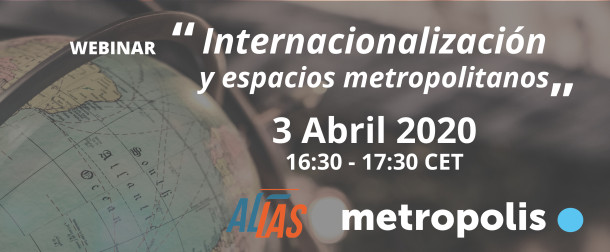
Local governments implementing international actions
On April 4th, local governments joined the webinar "Internationalisation and Metropolitan Spaces" organized by Metropolis in collaboration with the Euro-Latin-American Alliance of Cooperation among Cities (AL-LAs). The one-and-a-half-hour session, held in Spanish, opened a discussion among representatives from the International Affairs Offices of Bogotá City Hall, Barcelona Metropolitan Area, and Mexico City Government.
In a moment of crisis, the webinar brought together public officers, practitioners, and researchers from 16 urban spaces within Metropolis membership: Barcelona City and Metropolitan Area, Belo Horizonte, Bogotá, Bruxelles, Buenos Aires, Mexico City, Córdoba, Guadalajara, La Paz, Madrid, Medellín, Montevideo, Porto Alegre, San Salvador, and Valle de Aburrá.
During the online seminar, experts of the sector took the chance to explain why internationalisation strategies have to be implemented at the local scale, emphasizing that the city and metropolitan governments must understand them as public policies. "Today, the international action is an opportunity to integrate, not being left out; but most importantly, to improve the quality of life of citizens. In this, the role of regional and local governments is key"* stated in this line Paola Arjona, Technical Director of AL-LAs.
After defining the internationalisation of metropolitan spaces as a public policy, all speakers highlighted the relevance of cooperation with extra-national partners for the achievement of sustainable development goals. Nowadays, in fact, the New Urban Agenda enables the construction of a unified urban discourse aimed at meeting specific objectives for a sustainable future. And local governments are probably the main responsible for their implementation. In specific, Luz Amparo Medina Gerena, District Director at the Mayor's Office for International Affairs of the Bogotá City Hall, stated "The commitment of the Bogota administration to advance the achievement of the SDGs has tied the district management to the global agenda. This means that on the one hand there is a commitment to achieve these goals, but there is also an openness to learn from what is happening in other parts of the world in terms of their development and achievement."*
Even more, in this period of global health crisis, local governments understand how international relations help in finding quick and efficient solutions to specific urban issues. "[During this global health crisis] we are going to rethink our urban environments thanks to transnational research teams, and the resulting projects are going to have international funding. Moreover, we will learn to each other, comparing the experiences of different metropolitan areas around the world. Therefore, having a public policy that brings us closer to other urban realities in the world must be a priority"* said Oriol Illa, Director of International Relations and Cooperation of the Metropolitan Area of Barcelona. And it is examining other urban experiences that the differences between metropolitan realities can be understood and the obstacles to socially efficient internationalisation overcome. Among the several factors that have to be taken into consideration for the development of sustainable international strategies, Mariana Flores Mayen, Executive Director of Institutional Representation of the Mexico City Government, pointed out the governmental fragmentation at the local scale. Metropolitan coordination is, in fact, a key aspect to be able to compete in the globalized world.
The webinar was an opportunity to stress the role of international organization and local governments networks, like Metropolis, in achieving sustainable development goals and aligning with the New Urban Agenda. While cooperation is fundamental, city networks give a facilitated way to face the global challenge with more capacity and a comprehensive vision of the international reality.
This online seminar provided a great chance to have different visions on the very urgent topic of globalization. It will soon be replicated for the English-speaking and French-speaking public.
Here you will find the full video of the training in Spanish language
*translation by Metropolis
Webinar financed by:
![]()

